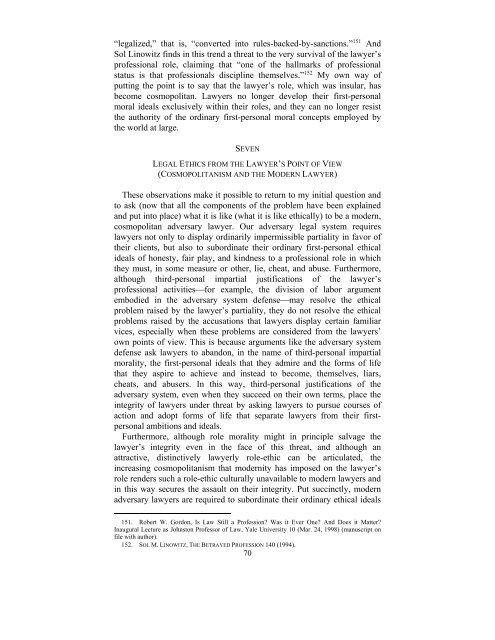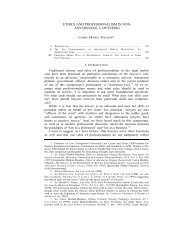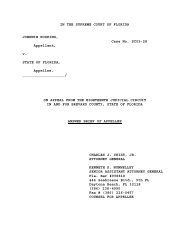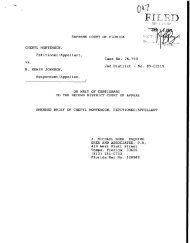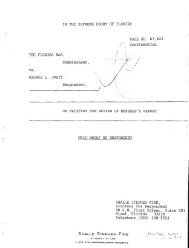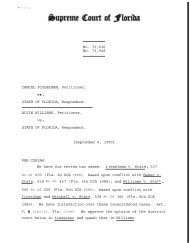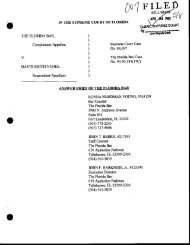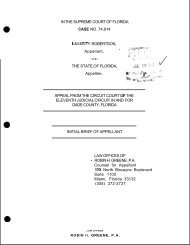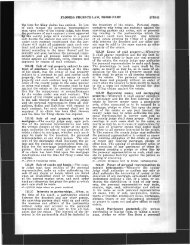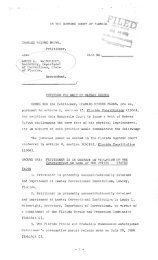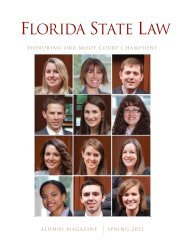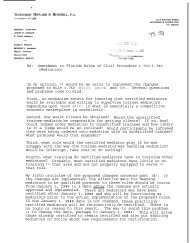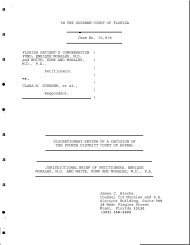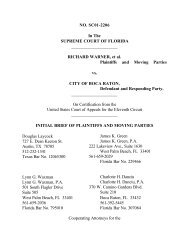The Morals and Politics of Adversary Lawyers - Florida State ...
The Morals and Politics of Adversary Lawyers - Florida State ...
The Morals and Politics of Adversary Lawyers - Florida State ...
Create successful ePaper yourself
Turn your PDF publications into a flip-book with our unique Google optimized e-Paper software.
“legalized,” that is, “converted into rules-backed-by-sanctions.” 151 And<br />
Sol Linowitz finds in this trend a threat to the very survival <strong>of</strong> the lawyer’s<br />
pr<strong>of</strong>essional role, claiming that “one <strong>of</strong> the hallmarks <strong>of</strong> pr<strong>of</strong>essional<br />
status is that pr<strong>of</strong>essionals discipline themselves.” 152 My own way <strong>of</strong><br />
putting the point is to say that the lawyer’s role, which was insular, has<br />
become cosmopolitan. <strong>Lawyers</strong> no longer develop their first-personal<br />
moral ideals exclusively within their roles, <strong>and</strong> they can no longer resist<br />
the authority <strong>of</strong> the ordinary first-personal moral concepts employed by<br />
the world at large.<br />
SEVEN<br />
LEGAL ETHICS FROM THE LAWYER’S POINT OF VIEW<br />
(COSMOPOLITANISM AND THE MODERN LAWYER)<br />
<strong>The</strong>se observations make it possible to return to my initial question <strong>and</strong><br />
to ask (now that all the components <strong>of</strong> the problem have been explained<br />
<strong>and</strong> put into place) what it is like (what it is like ethically) to be a modern,<br />
cosmopolitan adversary lawyer. Our adversary legal system requires<br />
lawyers not only to display ordinarily impermissible partiality in favor <strong>of</strong><br />
their clients, but also to subordinate their ordinary first-personal ethical<br />
ideals <strong>of</strong> honesty, fair play, <strong>and</strong> kindness to a pr<strong>of</strong>essional role in which<br />
they must, in some measure or other, lie, cheat, <strong>and</strong> abuse. Furthermore,<br />
although third-personal impartial justifications <strong>of</strong> the lawyer’s<br />
pr<strong>of</strong>essional activities⎯for example, the division <strong>of</strong> labor argument<br />
embodied in the adversary system defense⎯may resolve the ethical<br />
problem raised by the lawyer’s partiality, they do not resolve the ethical<br />
problems raised by the accusations that lawyers display certain familiar<br />
vices, especially when these problems are considered from the lawyers’<br />
own points <strong>of</strong> view. This is because arguments like the adversary system<br />
defense ask lawyers to ab<strong>and</strong>on, in the name <strong>of</strong> third-personal impartial<br />
morality, the first-personal ideals that they admire <strong>and</strong> the forms <strong>of</strong> life<br />
that they aspire to achieve <strong>and</strong> instead to become, themselves, liars,<br />
cheats, <strong>and</strong> abusers. In this way, third-personal justifications <strong>of</strong> the<br />
adversary system, even when they succeed on their own terms, place the<br />
integrity <strong>of</strong> lawyers under threat by asking lawyers to pursue courses <strong>of</strong><br />
action <strong>and</strong> adopt forms <strong>of</strong> life that separate lawyers from their firstpersonal<br />
ambitions <strong>and</strong> ideals.<br />
Furthermore, although role morality might in principle salvage the<br />
lawyer’s integrity even in the face <strong>of</strong> this threat, <strong>and</strong> although an<br />
attractive, distinctively lawyerly role-ethic can be articulated, the<br />
increasing cosmopolitanism that modernity has imposed on the lawyer’s<br />
role renders such a role-ethic culturally unavailable to modern lawyers <strong>and</strong><br />
in this way secures the assault on their integrity. Put succinctly, modern<br />
adversary lawyers are required to subordinate their ordinary ethical ideals<br />
151. Robert W. Gordon, Is Law Still a Pr<strong>of</strong>ession? Was it Ever One? And Does it Matter?<br />
Inaugural Lecture as Johnston Pr<strong>of</strong>essor <strong>of</strong> Law, Yale University 10 (Mar. 24, 1998) (manuscript on<br />
file with author).<br />
152. SOL M. LINOWITZ, THE BETRAYED PROFESSION 140 (1994).<br />
70


